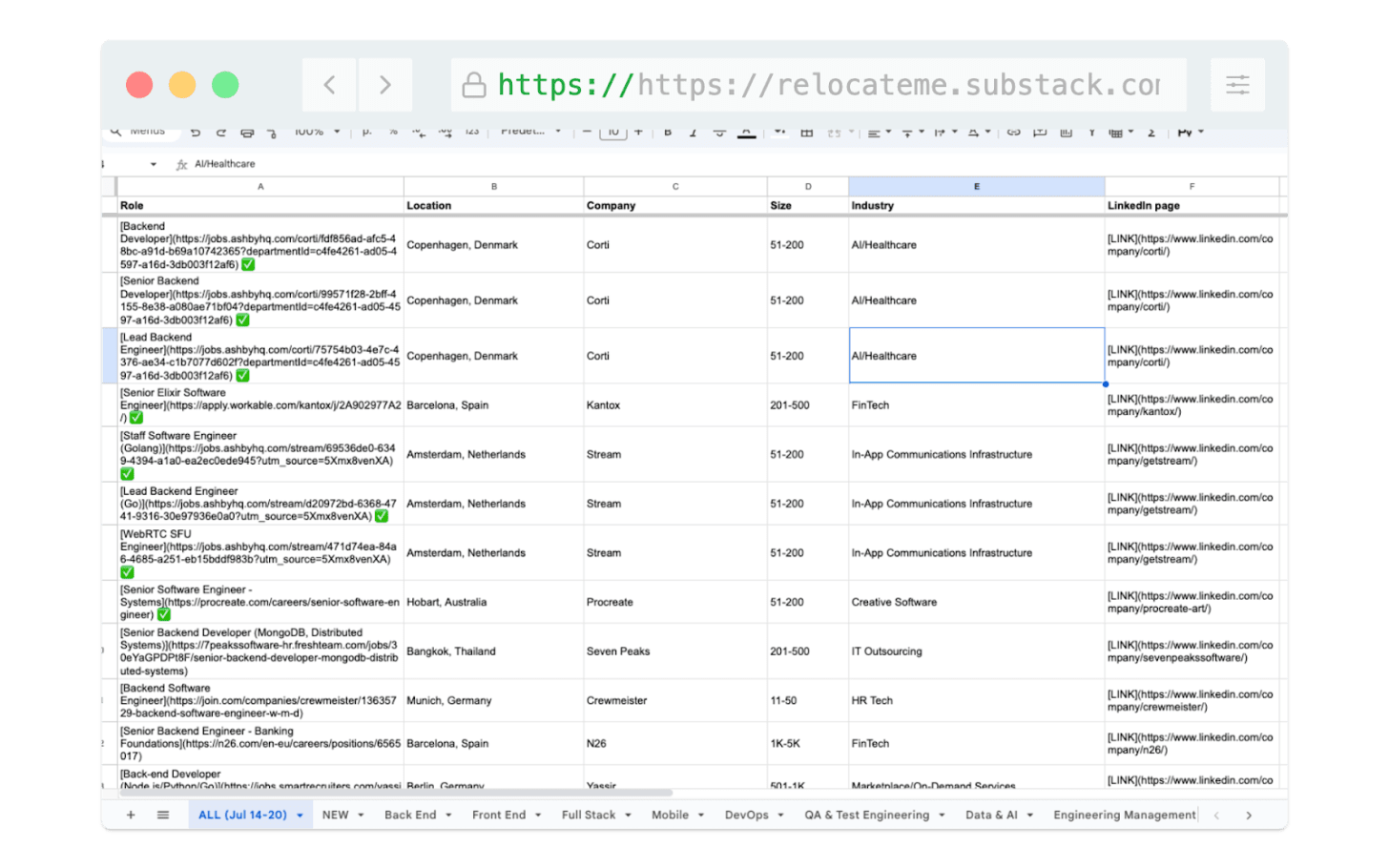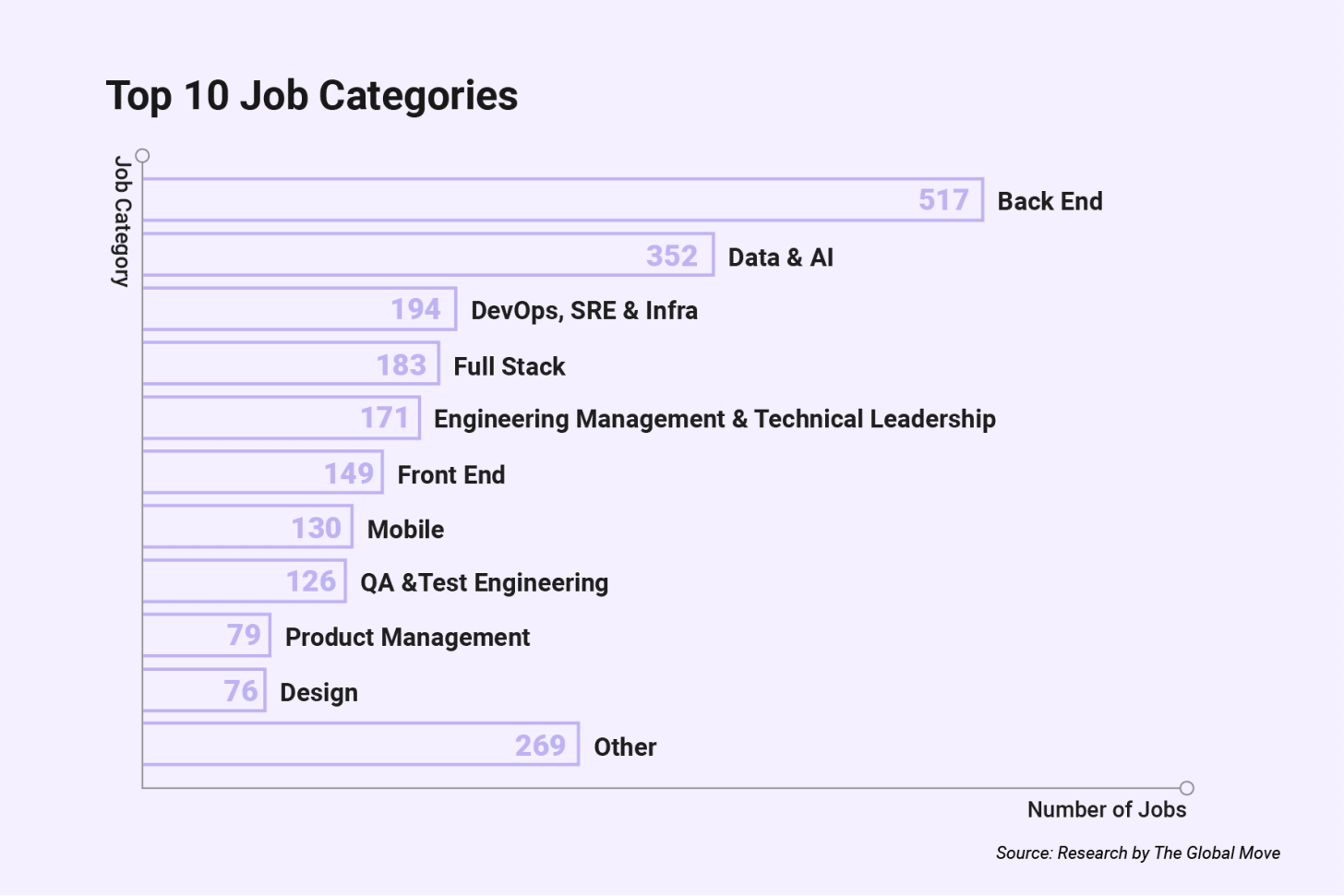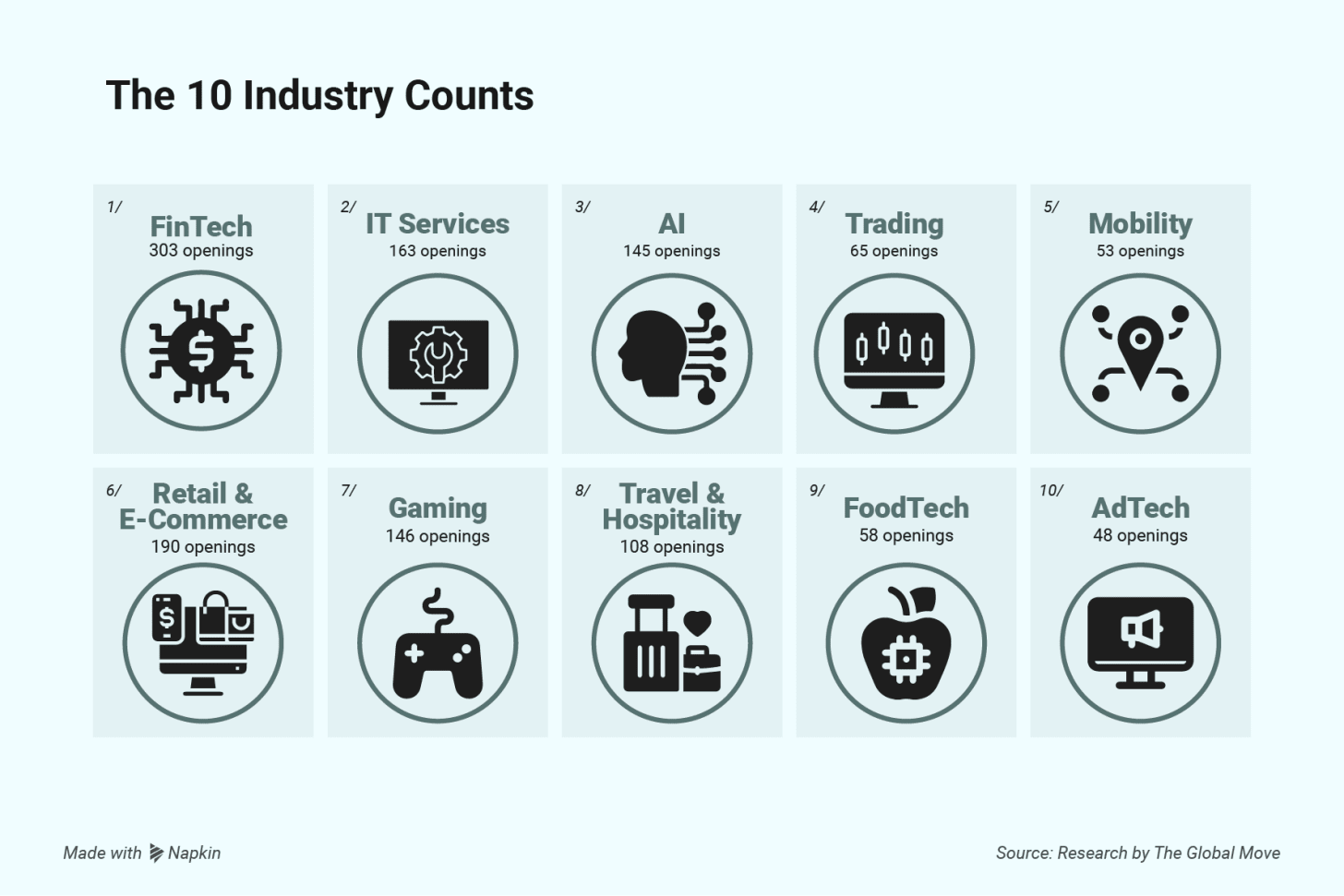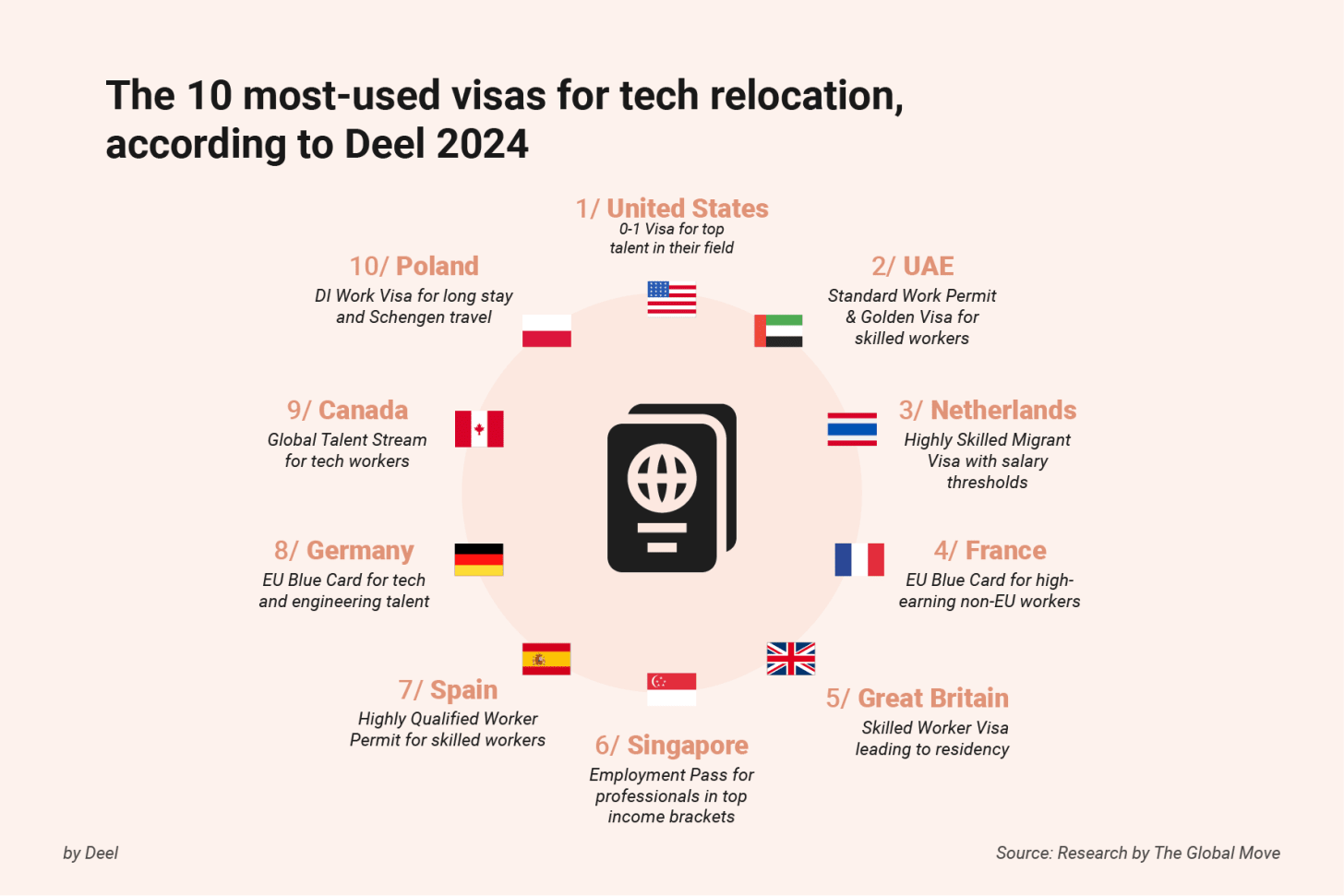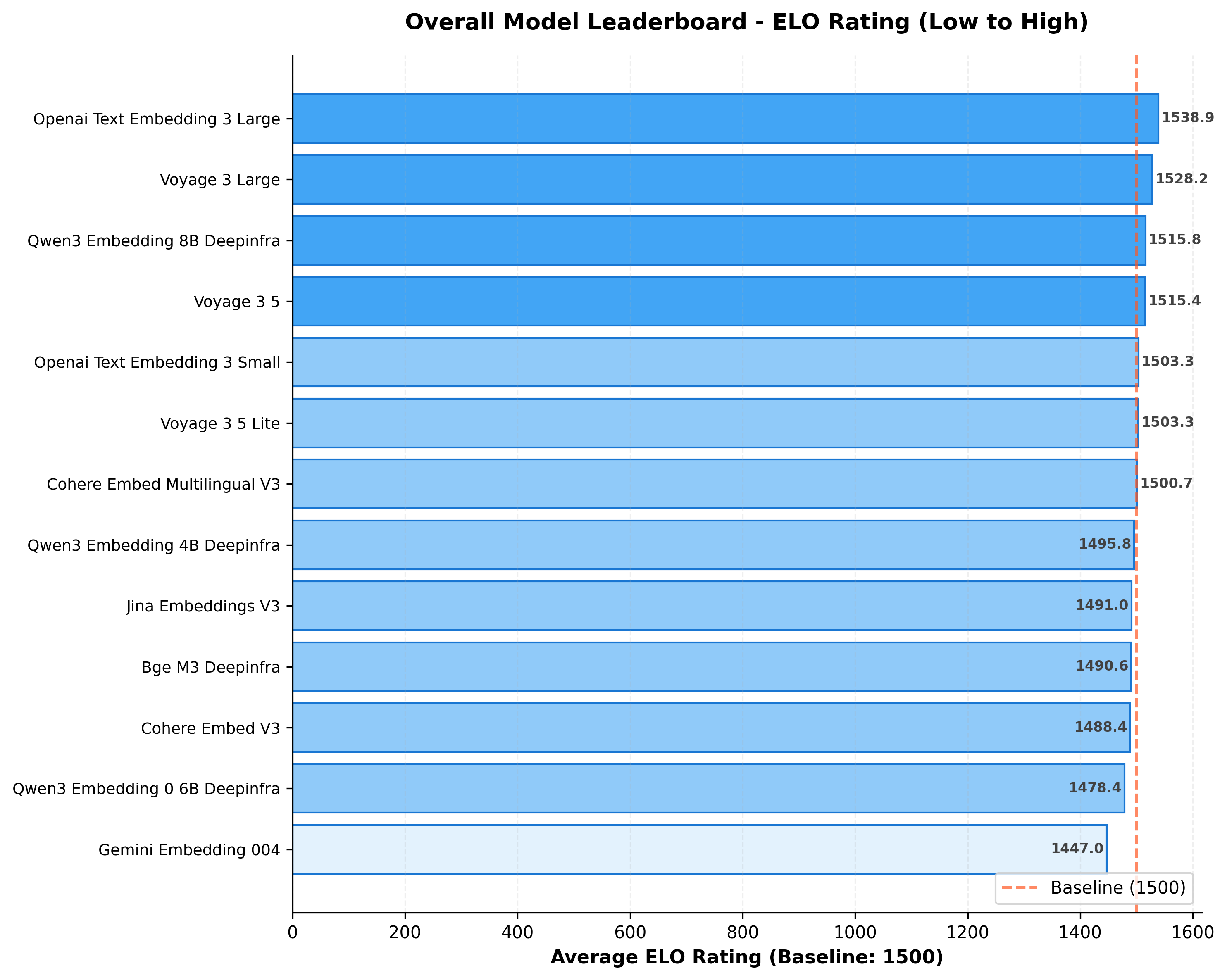This year alone, I analyzed 1,500 relocation-friendly jobs and came across some striking trends:
Germany has the most job postings for software engineers
Fintech is the hottest industry (even hotter than AI)
Scale-ups and mid-size companies are running more job ads than MAANG.
But that’s just scratching the surface.
I’ll first serve you with some third-party context. According to LinkedIn’s International Talent Migration Report (2023) the hunt for talent is, indeed, global. CEOs aren’t willing to sacrifice performance just to hire someone local. At least 2.6 million LinkedIn members relocated by more than 160 kilometers in 2022, the majority being international moves. The report also strongly suggests that software is the #1 industry for international talent migration. Since you’re reading The Global Move, that’s essentially good news after good news.
But we’re in 2025. So… how is the tech relocation scene looking like today? Since February, I’ve been tracking every tech job I could find that offers relocation and visa support. I’ve looked at over 1,500 listings—and not just the ones that say “we relocate the right candidate” or “must already have work authorization.” I verified each one manually to make sure these roles actually do what they claim: sponsor a visa and help you move to another country.
A screencap of how my listings look like. I started thumbing through thousands of job ads in February 2025 and got to discover some trends.
Some came from job boards. Some came from recruiters and hiring managers who reach out to share what they’re recruiting for. Every role included here was checked and filtered for accuracy, clarity, and, most importantly, real support for international talent.
The result is a clearer picture of where the jobs are, who’s hiring, what roles they need, and what this all means if you’re thinking of relocating with a tech job in 2025.
Here’s what the data shows—and what I think you should know before hitting “apply.”
Out of the 1,500+ jobs, Back End roles topped the charts with 517 openings—more than double the next category. Even in a world dominated by AI hype, the need for solid back-end engineering is still undisputed. That’s good news for experienced engineers whose skills might not sound flashy, but whose work makes things run.
At the same time, Data & AI roles are holding strong with 352 openings. Within that group, job titles like Data Engineer (72), Data Scientist (63), and Machine Learning Engineer (61) made up the bulk of listings. It’s also notable that DevOps and Infra roles rank third. This shows that global companies continue to invest in stability and scaling.
If you're hoping to land a job abroad this year, your best bet is, by far, Germany. It had 564 jobs in our dataset, or over a third of all listings. Berlin alone, easily one of the most English-friendly cities in a non-English-speaking country in the West, had more than 300 jobs. Though many readers might deem Germany an obvious number one, it's still a good idea to go over why. The country hosts over 139,000 startups, and 48 unicorns (a startup marked at one billion dollars or more) — two of which joined the list in early 2025. Five of these, like DeepL, have secured some of the largest funding rounds of 2024.
But my data on Germany doesn't come as a surprise because the German economy has been growing (almost) nonstop for the past few years (there was a slight contraction in 2023, and it’s currently in stagnation, but it’s still a gigantic economy.) And as it grows steadily, Germany is experiencing a significant skills’ shortage, particularly in STEM. Conversely, many organizations agree that Germany is a great place for skilled workers looking for a rewarding job abroad. After having a policy for a long time of limiting immigration for non-EU workers (with the notable exception of its policy to hire Turkish workers in the 1960s), Germany has been moving more and more toward openness since the early 2000s. The finishing touch of this was the signing of the Skilled Labour Immigration Act in June 2019, which recognized the important contributions skilled immigrants can make to the German economy.
If you prefer chilled sangria and sunny days instead of currywurst and crowded club nights, Spain also demonstrated its remarkable job-market might during my examination. Barcelona and Málaga were particularly hot spots—likely triggered by Spain’s emerging role as a tech hub for Southern Europe and its 2023 Startup Law. With 8,580 active tech companies in 2025, a 22% increase from 2024, Spain’s tech industry generates €14.8 billion in annual economic impact and employ over 108,000 people. Additionally, the cost of living (especially compared to cities like Amsterdam or London) makes it appealing for both companies and employees.
Meanwhile, Cyprus made the top 5. It may not be top of mind for most jobseekers, but its business-friendly tax regime and strong Fintech and Cybersecurity industries are making it an ideal relocation destination. Cyprus offers Personal Income Tax incentives for new residents, such as a 50% income tax break on your salary exceeding €55,000 per year, and a 20% tax break for those earning under €8,550 per year. In addition, the government is investing heavily in the Cypriot tech sector through strategic initiatives like the National Digital Decade Strategic Roadmap. If you’re open to less traditional landing spots, this could be a hidden gem. It clearly punches above its weight when it comes to tech jobs with relocation!
Some companies offering relocation-friendly tech jobs that belong to this list and countries are CompuGroup Medical in Germany, Welltech in Cyprus, or Multiverse Computing in the Basque Country in Spain.
You can learn more about these jobs by visiting my weekly hand-curated jobs with relocation list →
In my research, Germany came in first and Spain came in second in terms of how many relocation-friendly jobs were posted in 2025.
I was curious to understand how this matched with other datasets. That’s why I connected with Karoli Hindriks, founder and CEO of Jobbatical (go watch her TED talk.) Established in 2014 and the subject of multiple investment rounds, Jobbatical is a services provider and tech platform that helps companies relocate top talent to countries all over the world.
What Karoli told me mirrored my findings. According to Jobbatical data, in the past 12 months, the top 3 destinations relocated to in Europe were Germany, Spain, and the UK, in that order. This means that positions #1 and #2 matched exactly in both my data and her findings. UK, which came in third in her records, came through as a close #4 in my dataset. And this indicates that the job postings and the complete relocations are more or less aligned.
One immediate, and exciting, conclusion from this is that companies that post job ads actually carry through with the hiring and relocation. They bring their promise home. This is a breath of fresh air against ever-lasting dark rumors of how some job postings are ghost job postings. Since the jobs I feature are hand-picked, this never troubled me, but the data now validates it for my audience.
Another piece of interesting data that Jobbatical shared with me were the nationalities that they were relocating the most in the past 12 months. They mentioned that India, USA, and Türkiye were the top three. This makes so much sense. India, for example, receives around 75% of all H-1B U.S. visas, while Canada has one of the biggest Sikh populations outside India. These are two countries where people from India have clear routes to. Conversely, as I’ve discussed, many American citizens are wanting out of the USA, and their country has some great arrangements to move to Europe. Also, Germany has a well-established Turkish population and people from Türkiye probably have numerous safety nets there. So the Jobbatical numbers are a more explicit illustration of what I’ve been witnessing all these years.
When it comes to sectors, Fintech was the clear leader with over 300 jobs listed. The next most active were E-Commerce, IT Services/Custom Software, Gaming, and AI. Yes — AI is not the top industry relocating talent.
This ranking mirrors some larger trends. Fintech is still abuzz with post-pandemic investment. The sector moves fast and is strategically important to the global financial system (because it gets so many people who’re outside the banking system, well, into the system) so it has a strong appetite (and a bountiful runway) for world-class tech talent.
Gaming’s appearance in the top 5 might surprise some readers of The Global Move, specially after 2024’s wave of layoffs. Even so, global gaming revenues reached $187.7 billion in 2024, and are estimated to reach $200 billion this year. Development and technical roles are the highest in demand. Also, keep in mind that many successful gaming or gaming-adjacent companies come from expats. I remember the founder of Godot making rounds online when he admitted he had to move to a new country to support his business. That’s the sad part about relocating, and I certainly hope he’s fine now.
Meanwhile, AI has clearly moved from R&D to production. Companies are building and shipping real AI-powered products, and they require the engineers, product managers, and infra teams to support that work at scale.
Let’s bust a myth here with a scoop I uncovered. The fact: Most relocation-friendly jobs aren’t coming from tech giants. The overwhelming majority of roles came from mid-sized companies—those with 51–500 employees.
What does this mean for you? It means you don’t need a Google or Amazon offer to move abroad. It means smaller, fast-growing companies are often the most flexible, open-minded, and proactive about hiring internationally. Likewise, it tells us that smaller companies might be more willing to sponsor relocation because they’re in growth mode and can’t find enough local talent. So they go global.
If you’ve been waiting for a Big Tech brand name to take you across borders, then stop waiting. You might be missing 80% of the action.
Relocating with a job offer is one thing—to get the right visa is another. We can see which visas companies are really using to move tech workers across borders in Deel's 2024 Global Hiring Report.
Here are the top 10 most-used relocation visas globally, based on Deel’s internal hiring data:
While most of these visas are employer-sponsored, not all of them are. The O-1 visa (U.S.) is one of the few high-skill relocation options that technically falls under what I at The Global Move call “Employer not required”. If you can prove exceptional ability—through publications, awards, high salaries, or standout projects—you can apply and build your own path to the U.S. job market without a pre-arranged offer.
And the U.S. isn’t alone here. Other countries have similar options—like the UK’s Global Talent Visa—that are often overlooked but offer incredible flexibility for experienced professionals in tech, research, and innovation. These alternative visas can offer more freedom and faster timelines than traditional work permits, especially for people with an established track record.
If you're a recent graduate or early-career professional, you’re not out of options, either. Countries like Germany, Austria, and Sweden offer jobseeker visas that let you move first and find a job locally, without employer sponsorship upfront. I’ve written breakdowns of all these programs on The Global Move if you want to determine which one best matches your personal history and goals.
If you’re thinking about moving abroad with work this year, here’s how I’d approach it. First, know where your strengths lie. Back-end development, data, and infrastructure roles are by far the most in-demand for international hires right now—these are your strongest cards to play. Next, shift your focus away from tech giants and look closely at mid-sized companies. According to our data, these firms are the most active in sponsoring visas and offering relocation support. It also pays to think beyond the obvious. Germany is great, but don’t sleep on Spain, the Netherlands, or even Cyprus.
Don’t just fire off applications blindly. Most roles—up to 80%, in fact—are filled through direct outreach, referrals, or recruiters proactively searching for talent on LinkedIn. That means it’s better to build a strong presence and strategy than to spam your resume across job boards. And if you’ve been thinking you’ve been rejected by an ATS or suspect the system is rigged, I’ve got news: that’s just a big myth. What you need is better targeting, a sharper story, and a little patience.
And finally, don’t assume that a job offer is the only way to move. Plenty of countries are accessible with “Employer not required” options, like jobseeker visas and talent visas. These can allow you to relocate first and job-hunt locally.
And most importantly, subscribe to The Global Move for the latest tips, pieces, and hand-curated relocation-friendly tech jobs for 2025.
.png)

